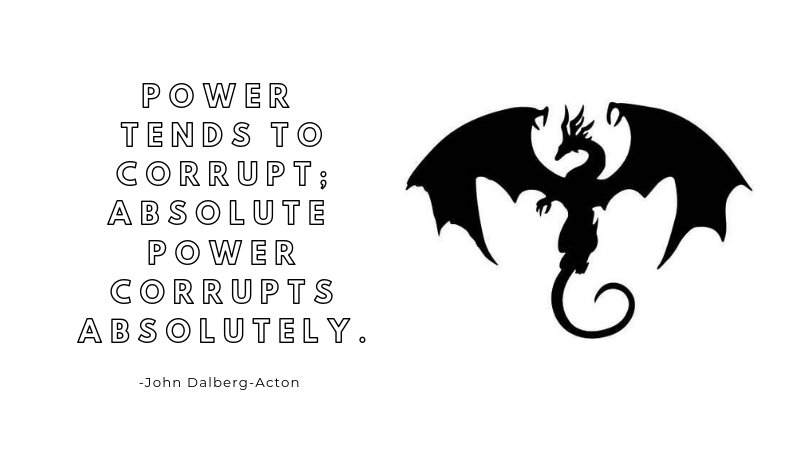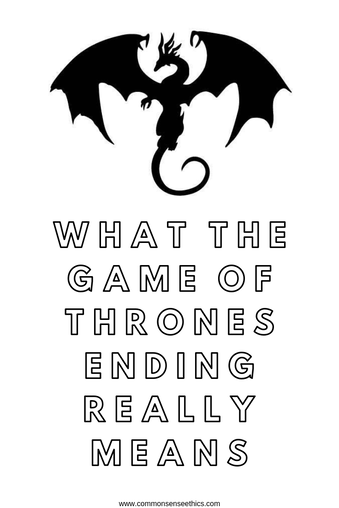Game of Thrones, the show based on the Song of Ice and Fire novels, is a bit more about putting spectacle over story. But Queen Daenerys as the final villain, rather than Cersei or the Night King, is George R. R. Martin's surprise ending, make no mistake about it. Viewers were naturally horrified to watch a sympathetic character turn bad, but that's the whole point! We were tricked in order to get us to understand the cruelty and horror of war by watching a character we knew and maybe liked become a tyrant.
This isn't just my hot take on it, either. George R. R. Martin was a conscientious objector to the Vietnam War. He acknowledges that the perception of war as something glorious is a problem. Though not a radical pacifist, he states in this interesting clip that his goal with A Song of Ice and Fire, is to show the true cost of war.
Violence under the guise of "breaking the wheel," promoting democracy, human rights, and most other justifications is still abominable. That is why we should be looking for non-violent solutions to problems rather than perpetually glorifying war and violent conflict.
Those criticisms are absolutely valid, and the rushed nature of the final six episodes is the main reason why many people did not like the ending.
But, let's be clear - the reason the show ended the way it did, with Daenerys becoming the final villain, is because of the overarching anti-war theme in the novels. Back in 2014, I wrote about this topic in a post entitled Evil in the Hearts of Men: Pacifism and Ethics in Game of Thrones/A Song of Ice and Fire.
And to be fair, regardless of the poor writing that hampered the final three Game of Thrones seasons, it's probably safe to assume that in 2010 when filming began, the show runners didn't expect to be writing the ending to George R. R. Martin's still unfinished novels. They expected to adapt two finished novels, which still as of this writing have not been published - an unfortunate topic for another day.
So, instead, let's discuss what the show's ending is really about.
The True Cost of War
But really, if you look closely, the warning signs had been there all along. Daenerys originally surrounded herself with advisers who's job it was to check her baser instincts, but as the story progresses, she begins to become more ruthless. In the course of her conquests, Daenerys burned or crucified anyone who stood in her way, and only her advisers restrained her from doing worse.
I would not say that Daenerys necessarily goes mad when she decides to Burn King's landing to the ground - she is doing what makes sense to her. She even says as much to Jon Snow, in a Machiavellian turn, that she must rule by fear. Total war with maximum civilian casualties is a strategy used to instill fear and ensure conquest.
Genghis Khan, whom the Dothraki were modeled after, was known for using the total war tactic historically. The Mongol armies sometimes sacked a city and killed everyone in it, that way, the next city would simply pay tribute rather than risk having the same thing happening to them.
George R. R. Martin is on record stating that dragon's are like weapons of mass destruction that can inflict massive civilian casualties and damage. Episode Five drove this home. Arya, even a trained assassin who took out the Night King, was completely powerless against the unstoppable force of a dragon.
We weren't supposed to cheer for Daenerys and her dragons all along, or Robb Stark, or even Stannis for that matter, because all that they really brought to Westeros was death and chaos through endless war. No one wins in war, and innocents suffer when the high lords seek power. As Bertrand Russell writes, war doesn't determine who is right, only who is left.
This is why it is great that diplomacy wins out at the end of the show rather than recourse to more conflict.
Personal Moral Failure
George R. R. Martin takes the Aristotelian view that most people struggle with moral choice and ambiguity, rather than a Hobbesian view that people are naturally bad. "All of us have the capacity for good and all of us have the capacity for evil; it's a question of the decisions we make… I like to paint in shades of gray and to try to reflect, even in a fantasy context, some of the complexities of real life,” Martin states.
Jamie Lannister's arc (assuming it ends similarly in the books) has to do with the limits of redemption and the draw of pathological relationships. Jamie starts out a very morally murky character. He pushes Bran Stark out a window, leaving him paralyzed, in order to conceal his incestuous relationship with his sister Cersei, an even more morally murky character. This action on Jamie's part is one of the major causes of the War of the five Kings, a tragedy that envelopes Westeros.
But as the story progresses, we see Jamie flourish. He manages to separate himself from Cersei's pathological influence. Through his relationship with Brienne and other factors, he becomes a more honorable man. But when Jamie hears from Sansa that Cersei will likely die when Danny attacks King's Landing, he can't help himself but return to her, although this action directly leads to his death.
Jamie's failure to be fully redeemed ultimately hinges on his inability to overcome his upbringing and unhealthy love and family dynamic. Unlike Theon, another redeemed character who was raised by Ned Stark, an essentially honorable man, Jamie was raised by Tywin Lannister, who is shrewd, megalomaniacal and nepotistic.
Jamie's story is a subversion of the hero's journey, and unfortunately rather true to life. Many people fail at becoming what they could ideally be. Assuming the books play out in similar fashion, sometimes habits and upbringing are just too strong to overcome.
Just Rule Is Difficult (Or Maybe Even Impossible)
Ruling is hard. This was maybe my answer to Tolkien, whom, as much as I admire him, I do quibble with. Lord of the Rings had a very medieval philosophy: that if the king was a good man, the land would prosper. We look at real history and it’s not that simple. Tolkien can say that Aragorn became king and reigned for a hundred years, and he was wise and good. But Tolkien doesn’t ask the question: What was Aragorn’s tax policy? Did he maintain a standing army? What did he do in times of flood and famine? And what about all these orcs? By the end of the war, Sauron is gone but all of the orcs aren’t gone – they’re in the mountains. Did Aragorn pursue a policy of systematic genocide and kill them? Even the little baby orcs, in their little orc cradles?
Martin hits on the reason that just rule is so hard, or even impossible, and it essentially boils down to a utilitarian problem with the nature of leadership and government itself.
For better or worse, rule is usually a matter of give and take, or balancing one group's rights with those of another. Often there are no ideal solutions to political problems. Rule always requires compromise, but very often, that compromise entails someone getting unjustly punished or killed. This is why ideally, political compromise should avoid recourse to violence as I mentioned above.
Those in power often do what is politically expedient in the name of the "greater good". But what about the people on the loosing end? There is no greater good if it's you and your family who gets unjustly punished or killed by political compromise, so how can that be just? It's paradoxical.
Realistically, when it comes to government, there is better and there is worse, but no ideal. I am launching a Socratic Dialog on Government on my YouTube channel in the coming months to discuss this very perplexing problem.
Tyranny is Cyclical
British historian Baron Acton is famous for the old adage that power corrupts, and absolute power corrupts absolutely. It is not entirely clear whether Acton is correct because the power-hungry purposefully seek out positions which will allow them to exercise control, or because of some general flaw shared among most of humanity where increased power correspondingly erodes our sense of morality.
But certainly this tendency accounts, or partially accounts, for why tyranny is cyclical. Power can turn even a good person bad. As Daenerys' power grew, so did her thirst for death and vengeance. She is fond of burning people alive, after all. But many people accepted her as a hero because of the way she is presented - a beautiful woman who's actions seemed to be justified if we don't look too closely.
This story is about letting history play out exactly as it always has. Nothing has changed. What we witnessed is the rise of a tyrant. Some of us rooted for her and watched in awe as she conquered foe after foe. And then we saw it. The final villain in the series is not the Night King and it's not Cersei: it's Daenerys.
Either way, the corrupting influence of power should be acknowledged, along with the fact that it takes a person of exceptional character to resist the various temptations of power. This is perhaps why Varys, who is well acquainted with tyrants, argues that Jon Snow should rule since he does not desire power.
George R. R. Martin's writing makes it clear that the person who desires the throne should not be on it. For this reason I personally found Bran's ascension satisfying, even if the show writing was a bit muddled and rushed.
Though it isn't ultimately clear that oligarchy will stop the cycle of tyranny any better than hereditary monarchy has, at least for a time, there will be peace in Westeros.
-----
So what can we learn about the human condition from Game of Thrones?
First, no matter how benevolent they appear, leaders should never be viewed as heroes. We should always remain somewhat skeptical about their motives. Some tyrants come as liberators.
Second, we should look for non-violent solutions to problems if we ever want to "break the wheel." Have you ever seen a war where innocents did not die by the thousands? That is what George R. R. Martin's story has always been about.
You May Also Like:
Breaking Bad's Secret Message
Solomon Kane: Must See Fantasy Flick About the Surprising Paradox of Nonviolence
Is Democratic Government a Utopian Ideal?











